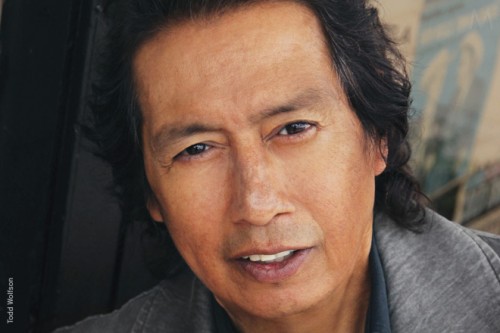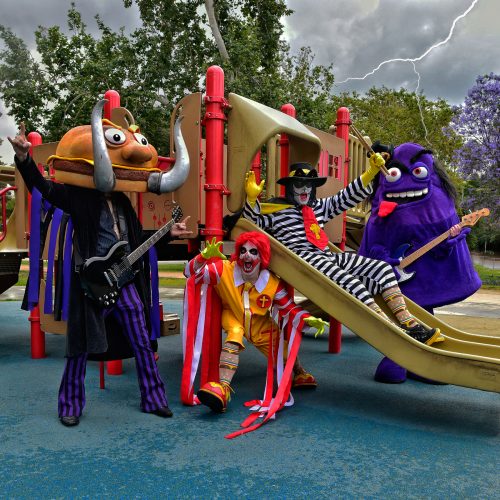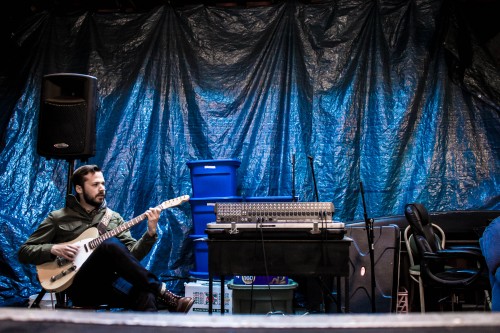By Michael Lello
From his days growing up listening to garage bands in Huntington Beach, Calif., to opening for the Sex Pistols as a member of the Nuns, to forming the True Believers and launching a solo career that has produced more than a dozen albums, Alejandro Escovedo has maintained a punk rocker’s spirit.
“You know that Joe Strummer line, the most punk rock thing you can do is be kind to someone else? Everyone seems to think that punk or punk rock is about destruction, but what it’s really about is creation, and it’s really about dismissing all the bullshit in life and getting down to the core of reality and the honesty in life,” a straight-shooting Escovedo told Highway 81 Revisited during a phone interview last week.
With Escovedo and his band The Sensitive Boys set to play the F.M. Kirby Center’s “Live From the Chandelier Lobby” series this Tuesday, April 15, we chatted with the veteran singer, songwriter and guitarist about putting together a setlist, the spirit of punk rock, why he avoids politics and the outpouring of support he received when he was diagnosed with Hepatitis-C.
H81R: You have lots of material to choose from when you go on tour. How do you go about putting a setlist together?
AE: I rely a lot on the band to kind of bring it up, because my mind is so in focus to get on with the next record. I’m already trying to write other songs, so there’s a lot of material that has come from the past that I don’t even know how to play anymore, quite honestly. But the boys help me. We’ve put in a song “Put You Down,” which was on “With These Hands” I think; it’s a great song, and it was always great with the strings. So once the strings left, we hadn’t really done it. We brought it back and it sounded really good. So then we started getting a vibe for the set. The set we’re doing right now is a little more rockin’, you know? So we bring in like “Real As An Animal,” we learned a Tom Waits song called “Goin’ Out West” that we do a great version of, we still do “Hurricane” by Neil Young, we do songs like “Everybody Loves Me,” which we hadn’t done in a long time, “Chelsea Hotel,” “Sally Was A Cop,” “Can’t Make Me Run.” So we’re relying on more rocking stuff.
H81R: You’ll be playing something like the New Orleans Jazz Festival this summer, and by contrast you’ll be playing an intimate show here in Wilkes-Barre for a few hundred people. Does your approach differ based on the type and size of the venue?
AE: I think it does, because when you have an audience from let’s say 200 to 400 people, you can get much more intimate about the storytelling part of it, I take a lot of time to explain the songs. It’s a much more casual kind of affair. And we put on a show, but I think everyone feels more a part of it when it’s a smaller crowd. When you get into a larger arena, more people, thousands of people – we did one show for 75,000 people with Bruce (Springsteen) for the Harmony Fest in Milwaukee – you kind of concentrate more on the first, I don’t know, third of the crowd I guess. So you try to concentrate on just getting the big sound across. And I think there you lose a little bit, not a little, you lose a lot of intimacy. I don’t think that crowd wants to sit and listen to me tell a three of four minute story about my family, they’d rather just getting on with the music.
H81R: You seem to work pretty quickly and have a new album out about every two years. So are you due for a new one?
AE: Yes I am. I’ve been working on writing this record, I want to do a record with Peter Buck and Scott McCoy, I did a tour with them a couple months ago, and it was a really great tour. So we decided that we are going to do it again in November, and we also decided that we’re going to work together to make a record. So I’ll be using my boys and their bands, and somehow we’re going to make a record together. I love working with them, and I think it’s going to be an awesome album.
H81R: Another guy you’ve worked with extensively is Chuck Prophet. How did that start?
AE: I think I met him on one of the first gigs we played with (Prophet’s former band), Green on Red, The True Believers, you know. He was this young blonde kid from Orange County, and they called him Billy The Kid Prophet. I saw this kid and he was just phenomenal as a guitar player, and a really cool-looking kid, sweet guy, and we became friends. Green On Red even mentioned the True Believers in one of their tunes. So they were compadres of ours. We hung out a lot.
Over the years, as we both became solo artists, we ended up on the same booking agency for a while and just really supported each other’s thing. And when it came time to make “Real Animal,” we were touring together as solo artists, and I kind of had this idea of what I wanted to do but I didn’t really know how to go about it. I remember starting the record and not being happy with the results. I really wasn’t nailin’ it. I remember sitting in a parking lot in Ann Arbor (Michigan) and asking Chuck if he wanted to come out to Texas and try to do this. I was giving him the ideas I had for the record, the concept I had. It was going to be an autobiographical album about all the bands I had been in. He came out, and the first one we wrote was a song called “Slow Down,” which is the last song on “Real Animal,” and it was a brilliant song I think. So we set the bar really high. And we really just had so much fun working that we did it again on “Strange Songs Of Love” and again on “Big Station.” So this will be our fourth album writing together.
H81R: What type of impact did growing up in a musical family have on you?
AE: Tremendous. I was kind of like embedded. Hearing my father singing is probably the first thing I can remember. There was always music, there was always records, there was always rock ’n’ roll, there was always kinda this Latin music. My parents were very good to us in that respect. Elvis Presley didn’t freak them out, Chuck Berry didn’t freak them out, The Beatles didn’t freak them out. My mom loved Mick Jagger and my dad loved Jim Morrison, so it was all good.
H81R: What drew you to punk rock?
AE: I guess it was my love for bands like The Yardbirds and The Pretty Things and the more kind of obscure things, Captain Beefheart, The Velvet Underground, The Stooges obviously. I loved the garage bands, all those really cool bands. The Shadows of Night. And in Orange County, where I grew up in Huntington Beach, California, there were a lot of great bands, (like) The East Side Kids. They were really awesome garage bands, and we got to see them all the time at teen dances and stuff. So that type of music always resonated with me. I loved the rawness of it, the honesty of it, the complete primitive approach to it.
H81R: What elements of punk rock, either musically or philosophically, have remained with you as you’ve expanded into other genres?
AE: I think it’s more philosophical than anything. It’s the approach I have toward everything I do. . . .
In music, what I think it means is the artifice in rock ’n’ roll, which became so evident in the ’80s and the ’90s. . . . I have to go back further, let’s go back to the ’70s, where bands like Journey and ELO and all those bands just got ridiculous and totally out of reach to the kids on the street. So kids on the street needed something to identify with. They identified with David Bowie and Mott the Hoople and T Rex and Iggy Pop. These were the characters that spoke to kids on the street and seemed approachable at the same time. And they were making grand statements about that, and that was a big difference. And that’s something that I still try to carry with me, the accessibility, the sense that there is no barrier between the audience and the performer.
H81R: Austin is obviously known as a music town. Has living in Austin provided some sort of inspiration or support for you as a musician?
AE: I think it’s tremendous. If we were to look at my life and career in music geographically, Austin would have to be the center point, because that’s where I first sang in public, it’s where I first learned to write songs, it’s where I first got tutored by Townes (Van Zandt) and all those guys. Butch Hancock, these were amazing songwriters, Guy Clark was there, and then there’s all these guys that no one heard of like Rich Minus, Pat Mears, just amazing songwriters. So the song was always the most important thing in Austin. Austin’s the kind of town where you can’t go out there like a big rock star; people don’t buy it, because the guy behind the bar is probably a better guitar player than the guy on the stage. It’s that kind of place. I learned a lot, it was a huge influence, and it’s really where I began my thing, where I found my voice was in Austin.
H81R: Tell me about your decision to stop playing your song “Castanets” when you learned that it was on George W. Bush’s iPod.
AE: I hate politics in rock ’n’ roll, I really do. I don’t like the association, they just abuse it. Tony Blair is a perfect example of that, Clinton, all these guys claiming that they were in rock bands or whatever, they smoked pot, once, or whatever. I just never bought it. I don’t think that it’s good.
When the Bush thing came out I was really embarrassed. Of course my mother thought it was a good thing, but I thought it was embarrassing. So I said, well, let’s just not play that song anymore. It turns out, not only was it not my version on the iPod, I think it was the Los Lonely Boys version, but the whole iPod setlist had been chosen by his press secretary, which is more bullshit.
H81R: How has your Hepatitis C diagnosis affected your touring routine?
AE: I haven’t gotten rid of it. I’ve learned to live with it, and I’m doing a good job with it. I take care of myself. So far so good. I’ve been very lucky.
H81R: After your diagnosis, artists including John Cale, Ian MacLagan, Lucinda Williams and Calexico came together to record “Por Vida: A Tribute To The Songs Of Alejandro Escovedo,” which was released in 2004, with all the proceeds going to the Alejandro Escovedo Medical and Living Expense Fund. What was it like to get that kind of support?
AE: It was overwhelming and very humbling. You go through these different phases. You go through this phase where you’re kind of embarrassed about what has happened to you, you question what has happened to you, the why me kind of period, and when people start to reach out and help you, it becomes again this thing where it’s hard to accept other people’s help. I always wanted to be the guy to help other people, suddenly I was at the center point and all of the attention was being drawn to me because of my illness. And I didn’t want to be known for that, I wanted to be known as a songwriter.
Even though that wasn’t the way I wanted it to go, and it was quite frightening the way it went down, I really wanted to, I don’t know, I really wanted to show how much it meant. And it meant a lot. If it wasn’t for that support, I don’t think I would have made it.




[…] http://highway81revisited.com/alejandro-escovedos-punk-rock-heart/ […]
A great interview with a truly gifted and underappreciated artist. Well done.
[…] http://highway81revisited.com/alejandro-escovedos-punk-rock-heart/ […]